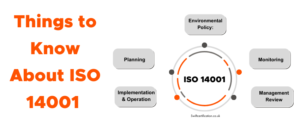Introduction
In an era where environmental consciousness is at the forefront of global concerns, organizations are increasingly seeking ways to demonstrate their commitment to sustainable practices. The International Organisation for Standardisation (ISO) offers a robust framework for environmental management through ISO 14001. As businesses evaluate the benefits of adopting this standard, the question arises: Is ISO 14001 worth it? In this in-depth exploration, we will dissect the advantages and potential challenges associated with ISO 14001 certification, shedding light on whether the investment aligns with the long-term goals and values of your organisation.
Understanding ISO 14001
ISO 14001 is an internationally recognised standard that provides a systematic approach to managing environmental responsibilities within an organsation. It sets out criteria for an effective environmental management system (EMS), empowering businesses to identify, monitor, manage, and improve their environmental performance. The standard is designed to be adaptable to various industries and sizes, offering a flexible framework that can be customised to meet the unique needs of each organisation.
Advantages of ISO 14001 Certification
Regulatory Compliance and Legal Risk Mitigation
One of the primary benefits of ISO 14001 certification is its role in ensuring compliance with environmental regulations and legal requirements. As governments worldwide tighten environmental legislation, organisations face increased scrutiny and potential legal consequences for non-compliance. ISO 14001 provides a proactive approach, helping businesses stay ahead of regulatory changes and minimise the risk of legal issues.
Improved Environmental Performance
ISO 14001 encourages organisations to adopt a holistic approach to environmental management. By identifying and evaluating the environmental aspects of their operations, companies can implement measures to reduce their environmental impact. This not only contributes to sustainability but also fosters a positive image among environmentally conscious consumers, partners, and stakeholders.
Cost Savings and Operational Efficiency
Implementing ISO 14001 often leads to increased operational efficiency and, consequently, cost savings. Through the identification and optimisation of processes, organizations can reduce waste, energy consumption, and resource usage. This not only aligns with environmental objectives but also positively impacts the bottom line, making the investment in ISO 14001 a strategic financial decision.
Enhanced Stakeholder Relations
ISO 14001 certification is a powerful tool for enhancing relationships with stakeholders, including customers, suppliers, investors, and the local community. Stakeholders are increasingly valuing environmentally responsible practices, and ISO 14001 certification serves as a tangible demonstration of an organisation’s commitment to sustainable business practices.
Market Access and Competitive Advantage
As consumers become more environmentally conscious, they are actively seeking products and services from companies that share their values. ISO 14001 certification opens doors to new markets and enhances a company’s competitive advantage by positioning it as a socially responsible and environmentally friendly choice.
Steps to Make ISO 14001 Work for Your Organisation
Commitment from Top Management
Successful ISO 14001 implementation requires unwavering commitment from top management. Leaders must communicate the importance of environmental management and provide the necessary resources to support the initiative. This commitment sets the tone for the entire organisation and reinforces the value of ISO 14001 certification.
Tailoring the Standard to Your Organisation
ISO 14001 is designed to be adaptable, allowing organisations to tailor the standard to their unique circumstances. Conduct a thorough analysis of your organisation’s environmental aspects and impacts, ensuring that the EMS is aligned with your business goals and objectives. This customisation enhances the relevance and effectiveness of ISO 14001 for your specific context.
Employee Training and Engagement
Invest in comprehensive training programs to ensure that employees at all levels understand the importance of ISO 14001 and their role in achieving environmental objectives. Foster a culture of environmental responsibility by actively engaging employees in identifying opportunities for improvement and encouraging their participation in sustainability initiatives.
Establish Key Performance Indicators
Set measurable KPIs to track the performance of your EMS. These indicators should align with your organisation’s environmental objectives and provide a clear picture of progress over time. Regularly review and analyze KPI data to identify areas for improvement and celebrate achievements, reinforcing a culture of continuous improvement.
Regular Internal Audits and Management Review
Conduct regular internal audits to assess the effectiveness of your EMS and identify opportunities for improvement. Additionally, hold management reviews to evaluate the overall performance of the system, ensuring that it remains aligned with your organisation’s strategic objectives. This ongoing monitoring and evaluation process are essential for maintaining ISO 14001 certification.
Conclusion
In conclusion, the decision to pursue ISO 14001 certification depends on various factors, including your organisation’s values, goals, and commitment to environmental stewardship. While the initial investment and challenges may seem daunting, the long-term benefits in terms of regulatory compliance, cost savings, enhanced reputation, and market access can be transformative.
Ultimately, the worthiness of ISO 14001 certification lies in its ability to align with your organisation’s values and contribute to its overall success in a sustainable and responsible manner. By carefully considering the advantages, potential challenges, and real-world impacts shared.




